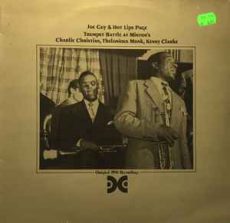
Daily Dose Of Jazz…
Joseph Luke Guy was born in Birmingham, Alabama on September 20, 1920 but much of his early personal life is obscured. He began his professional music career performing in New York City, and joined Fats Waller’s backup band in the late 1930s. Following that, in 1938, he succeeded Dizzy Gillespie in Teddy Hill’s orchestra.
Patterning his playing style after his musical role model, Roy Eldridge, despite his range, speed, and potential, Joe never managed to surpass Eldridge’s abilities, though he was considered a musical talent when taking into account his young age.
In 1940 he became a key soloist in Coleman Hawkins’ short-lived big band. 1941–42 saw Guy as a regular performer as a member of the after-hours band at Minton’s Playhouse alongside Nick Fenton, Kenny Clarke, and Thelonious Monk in jam sessions with early bop music. During this period he was actively involved in numerous recordings by Jerry Newman, and also appeared on songs by Charlie Christian, Hot Lips Page, Roy Eldridge, and Don Byas.
Incorporating Gillespie’s influences into his playing, Joe’s performance on Monk’s 1942 song Epistrophy is arguably the highlight of his recording career. Much of his appearances as an instrumentalist are marked by his enthusiasm and tempo, however, on occasions would over exert himself and consequently sound erratic.
Struggling with a heroin addiction throughout the majority of his brief career, in 1945–46 Guy was involved with Billie Holiday both professionally and intimately. When they were both busted for drug possession, the two cut ties thereafter. Afterwards, sidelined him from further success, he moved back to his hometown and fell into relative obscurity among the music industry.
Trumpeter Joe Guy, who performed locally in his hometown and advised others about the dangers of his addiction, transitioned on June 1, 1962, at the age of 41.
More Posts: history,instrumental,jazz,music,trumpet
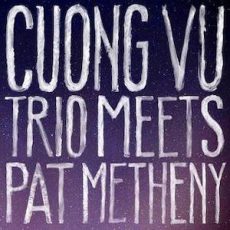
Daily Dose Of Jazz…
Cuong Vu was born on September 19, 1969 in Saigon, Vietnam and immigrated to Seattle with his family when he was six. At 11 he began to play the trumpet and later received a scholarship from the New England Conservatory of Music.
After graduation, in 1994 Vu moved to New York City and formed the group Ragged Jack with Jamie Saft, Andrew D’Angelo, and Jim Black. Since that time he has worked with Laurie Anderson, David Bowie, Dave Douglas, Myra Melford, Gerry Hemingway, and Mitchell Froom.
While a member of the Pat Metheny Group, he won two Grammy Awards for Best Contemporary Jazz Album: Speaking of Now and The Way Up. Cuong worked with Metheny mainly as a trumpeter, but also contributed vocals, guitar and various small percussion.
As an educator, he serves as chair and professor in the jazz studies department of the University of Washington’s School of Music. Trumpeter Cuong Vu has recorded eleven albums as a leader, thirty-three as a sideman, and continues to lead his own band with bassist Stomu Takeishi and drummer Ted Poor.
More Posts: bandleader,guitar,history,instrumental,jazz,music,trumpet,vocal
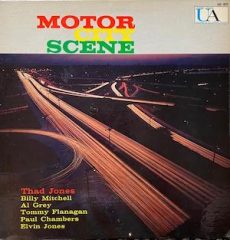
Requisites
Motor City Scene ~ Thad Jones Sextet | By Eddie Carter
This morning’s record submitted for your consideration is Motor City Scene (United Artists UAL 4025/UAS 5025) by The Thad Jones Sextet. It hit the stores in 1959 and consists of tunes composed by the leader. Thad comes from a musical family; both his brothers were excellent musicians. His older brother Hank was a consummate pianist, and his younger brother Elvin was a dynamic drummer whose birthday was recently observed on September 9. The ensemble is Thad Jones on cornet (tracks: A1, B1, B2), and flugelhorn (track: A2), Al Grey on trombone, Billy Mitchell on tenor sax, Tommy Flanagan on piano, Paul Chambers on bass, and Elvin Jones on drums. The copy used in this report is a friend’s US original Mono deep groove album.
Side One gets underway with Let’s Play One, an easy-going blues that Tommy opens with a brief introduction that evolves into the sextet’s collective theme. Tommy starts the solos with a relaxing presentation, next Al comes in for a laid-back statement. Billy steps up next to give a marvelous reading, then Thad contributes a very pleasant presentation. Paul walks leisurely into the finale preceding the ensemble’s finish. Minor on Top picks up the pace gradually on the group’s lightly-swinging melody. Thad leads off with a charming flugelhorn statement, then Billy hits a relaxed groove on the next solo. Paul constructs a delicious bass performance next. Al delivers the next reading with absolute assurance, followed by Tommy and Elvin who share an attractive exchange into the closing chorus.
Like Old Times takes the tempo up a few notches to start Side Two with the front line leading a brisk melody. Billy takes the lead this time with a swinging solo. Tommy says his piece next in a rollicking reading. Al romps through a lively presentation next. Elvin makes a brief appearance, followed by Paul who puts together a passionate performance. Thad gets the last word and cooks on muted cornet leading to the sextet’s ending. No Refill begins with a soft introduction by Elvin segueing into the sextet’s soothing opening chorus. Thad’s first solo on muted cornet is restrained in its mood of gentle warmth and graciousness. Billy handles the second statement discreetly, and Tommy adds the exclamation point with a thoughtful performance ahead of the sextet’s ending theme and slowly fades into silence.
Motor City Scene was produced by Tom Wilson, and the man behind the dials was Lewis Merritt. I was impressed with the sound quality of the recording. The album has a superb soundstage with vivid sonics. The instruments emerge from your speakers as if the sextet’s playing in front of your favorite chair and the record is quiet for its age. Thad and his colleagues are in excellent form throughout, and this album highlights Thad’s ability as a composer. If you’re a Hard-Bop fan, I invite you to check out Motor City Scene by The Thad Jones Sextet, the next time you’re out shopping for records. It may be hard to find, as the few LPs I’ve seen online are already at collector’s prices, but your diligence will be rewarded with a great album for your library that’s highly recommended!
© 2022 by Edward Thomas Carter
More Posts: choice,classic,collectible,collector,cornet,history,instrumental,jazz,music
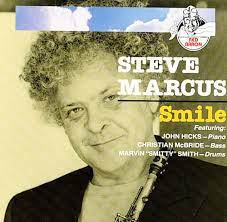
Daily Dose Of Jazz…
Steve Marcus was born September 18, 1939 in The Bronx, New York, and studied at the Berklee College of Music in Boston, Massachusetts between 1959 and 1961. He gained experience playing in the bands of Stan Kenton, Herbie Mann and Larry Coryell from 1963 to 1973.
His debut album as a leader included an arrangement of the Beatles’ song, Tomorrow Never Knows, which also was the album’s title. He worked with jazz drummer Buddy Rich for the last twelve years of the drummer’s life. After Rich died, Marcus led the band and renamed it Buddy’s Buddies.
Saxophonist Steve Marcus transitioned on September 25, 2005 in New Hope, Pennsylvania. He was 66.
More Posts: bandleader,history,instrumental,jazz,music,saxophone
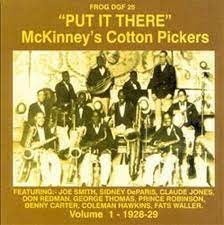
Daily Dose Of Jazz…
Bill McKinney was born William McKinney on September 17, 1895 in Cynthiana, Kentucky. Early in his career he worked as a drummer in a circus band until he was inducted into the Army in World War I. After service, he settled in Springfield, Ohio where he took over leadership of the Synco Jazz Band.
After hiring drummer Cuba Austin, McKinney worked as leader and business manager. After touring the U.S. Midwest, they got a residency at the Arcadia Ballroom in Detroit, Michigan in 1926. While there, they were heard by bandleader and music promoter Jean Goldkette, who arranged a more lucrative home base for the band in Detroit’s Graystone Ballroom. The band was renamed McKinney’s Cotton Pickers.
During the Great Depression the band broke up in 1934 and Bill led and played with a dance band in Boston, Massachusetts for a time. From 1937 on McKinney managed a Detroit Cafe with a dance floor and live bands who McKinney booked, while booking bands for other locations on the side.
Drummer Bill McKinney retired in the 1950s and spent his last years in his childhood hometown of Cynthiana, where he transitioned on October 14, 1969 at 74.
More Posts: bandleader,drums,history,instrumental,jazz,manager,music



